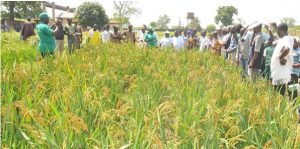February 13, 2017, Food Business Africa, NIGERIA – Dangote Rice, a subsidiary of Dangote Group, is set to launch a multi-million rice outgrower scheme in Nigeria to increase local production in the country.
Set to launch this week in Sokoto, the project aims to cover 25,000 hectares (Ha) in 14 states, according to Aliko Dangote, the CEO of Dangote Group.
 Dangote Rice plans to operate the outgrower scheme to empower local farmers, create job opportunities, diversifying Nigeria’s economy and reduce the nation’s food import bill.
Dangote Rice plans to operate the outgrower scheme to empower local farmers, create job opportunities, diversifying Nigeria’s economy and reduce the nation’s food import bill.
The company will distribute seedlings to local farmers for planting, after which it will purchase the produce for milling and final processing in its mills in the country.
“By year-end 2017, Dangote Rice plans to produce 225,000 metric tonnes (MT) of parboiled, milled white rice. This will allow us to satisfy 4% of the total market demand within one year.
“Our model can then be successfully scaled to produce 1,000,000 MT of milled rice in order to satisfy 16% of the domestic market demand for rice over the next 5 years,” says Aliko Dangote.
The project has been planned to start with a 500 hectares project in the Goronyo community in the state.
Statistics from the Federal Ministry of Agriculture and Rural Development (FMARD) estimates that rice demand in Nigeria reached 6.3 million MT in 2015, with only 2.3 million MT of that demand satisfied by local production, notes Dangote.
This local production shortfall leaves a gap of 4 million MT that is currently being filled through formal importation of rice or illegal imports over land borders, the company adds.
“Through the Dangote Rice Outgrower Scheme, Dangote Rice will partner with outgrowers (smallholder and contract rice farmers) to cultivate and grow rice paddy.
“Specifically, the company will provide inputs, technical assistance, extension services and land preparation services and equipment directly to farmers.
“At harvest, DRL will recoup the costs of inputs and services in-kind and will act as a guaranteed off taker for paddy that meets certain pre-agreed quality standards. Smallholder farmers will provide land and labour,” the company explains.
The company will establish raw material reception, drying, hulling, parboiling units and silos in strategic areas throughout the country near the outgrower communities.
Each site will store dried, hulled, parboiled bran rice. It will then transport this bran rice to a mill, where finished rice will be produced.
According to the company, the centralized outgrower model enables a high level of control over product quality and quantity.
The purchasing price given to farmers will reflect each season’s market price and will be set after an extensive market price survey and consultation with all stakeholders.
The company plans to have 25,000 Ha by the end of 2017 under rice cultivation across 3 sites in Northern Nigeria: Jigawa State (5,000 Ha), Sokoto State (10,000 Ha) and Zamfara State (10,000 Ha).
It plans to produce one million MT of rice from 150,000 Ha over by scaling the business outgrower scheme model to more sites and rice growing communities in the country over the next 5 years.